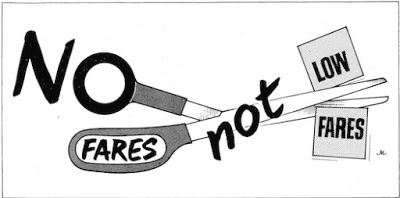No Fares Not Low Fares

Last May the voters of London elected a new set of leaders to run the Greater London Council. No more were they prepared to be governed by witless Horace Cutler and his fellow Tory rogues. The Labour Party swept to power on a wave of disapproval of Thatcher’s efforts and the radical rhetoric of reform was in the air. The press portrayed Ken Livingstone as the Joseph Stalin of County Hall, while Livingstone portrayed himself as the cleanest guy in town performing the dirtiest job in town. “Our Ken” was going to take on the might of the profit system. “Socialism in one city” was the battle-cry; the Metropolitan Police were going to be converted into a “democratic people’s militia”, it was to be the Paris Commune, Round Two. Leftist reformers fantasised with all of the impotence of old men in a porn shop: what they weren’t going to do to capitalism wasn’t worth doing. And the jewel in their crown—the Reforme Royale—was the new cheap fares policy for London Transport. “Fair fares for all” ran the advertising campaign, and the voters seemed to have got what they asked for. Little did they know that what they asked for was yet to come.
Under capitalism everything has to be paid for. After all, you can’t run buses without money, can you? Imagine trying to drive a bus from Brixton to Clapham without sticking pound notes into the engine! So Ken and the boys had to raise the cash. The answer they came up with was to increase rates by precisely the amount they were cutting fares. So, the rates went up and assorted Londoners hissed and booed and the fares went down and assorted Londoners (many of whom had been hissing and booing) cheered and thanked the Labour Party for making it cheaper to travel from A to B.
Not long after the fares went down and the rates went up, the Tory-controlled Bromley Council began to take legal action to outlaw the GLC fares policy. One thing can always be said about the Tories—they will stop at nothing to defend their system. First they went to the Appeal Court where they stated their case to Lord Denning—who was born in the nineteenth century and upholds the social conventions of the eighteenth century. According to the 1969 Transport (London) Act it is illegal for fares to be subsidised by the state and therefore Denning agreed with Bromley Council that the GLC—and the people who elected it—were aiming for something which is against the law. The GLC appealed to the House of Lords, which ruled that it was illegal not to run London Transport “along business lines”. Lord Wilberforce stated that LT had a duty to ensure “that outgoings were met by revenue” and Lord Diplock chastised the GLC for its “thriftless use of monies obtained from ratepayers and . . . deliberate failure to deploy to best advantage the full financial resources available to it . . . ” The result of this decision is that LT fares are due to rise by about 200 per cent.
